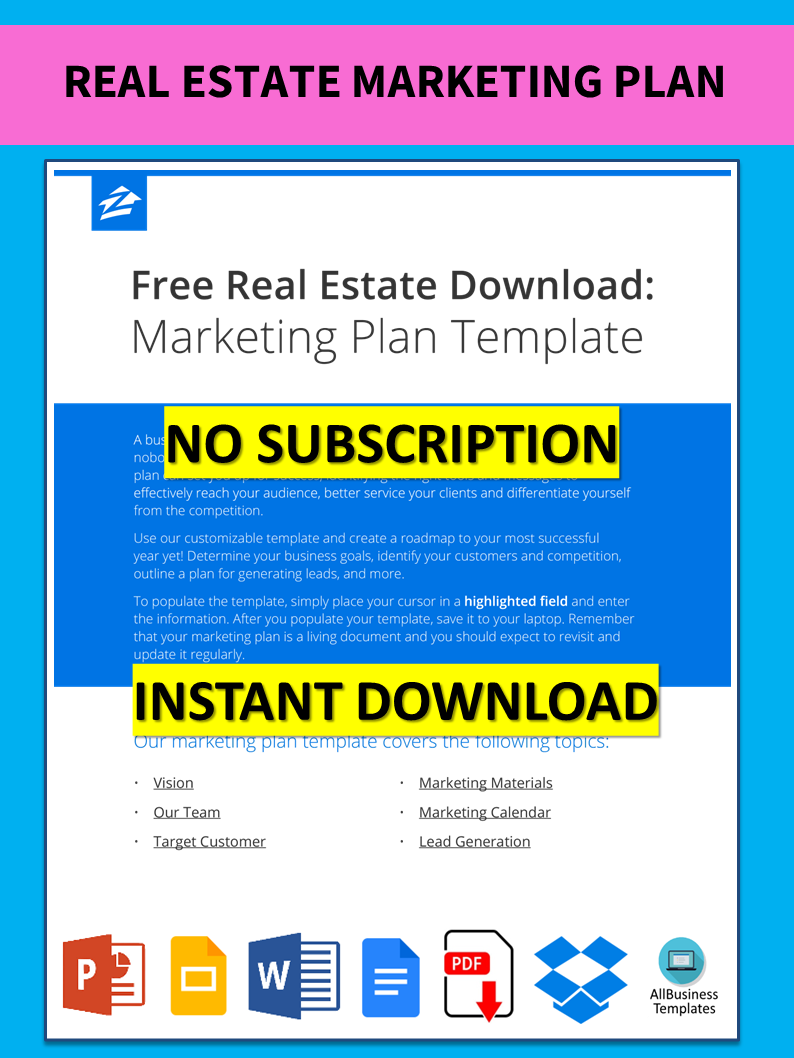Real Estate Marketing Plan

I-Save, punan ang mga blanko, i-printa, Tapos na!
What do you think are the advantages of putting in place a plan for marketing real estate? Do you desire to obtain a sample template for a marketing plan about land? Right here is the time to download the marketing plan for your property!
Mga magagamit na premium na format ng file:
.pdf- Itong dokumento ay sertipikado ng isang Propesyonal
- 100% pwedeng i-customize
Business Negosyo Marketing example home plan marketing plan customer Will kalooban Printable Marketing Plan Real Estate Marketing Plan Sample Real Estate Marketing Plan Example
What are the pros of having a property promotion plan? Were you in search of a sample property promotion plan template? We have what you want. Our model will support you in the formulation of an all-encompassing scheme that will help you achieve your objectives. It has passages regarding stating objectives, targeting potential clients, and important means of achieving them.
A real estate marketing plan is an extensive piece of paper that explains the maneuvers, strategies, and actions needed to promote a real estate venture to attain its leasing or selling objectives. It acts like a compass in reaching out to probable clients or tenants, placing the project above others in the market, and using marketing tools cleverly.
Why is the importance of a real estate marketing plan?
Well, because they have multiple functions such as giving the framework for increasing the sale of real estate property. And these, among others are:
- Informs and Consistency:
- Aligns Marketing Efforts All marketing activities for the real estate project must be geared toward achieving the overall objectives and goals of the business. It also offers clarity and specificity that helps marketers focus on the most productive actions while avoiding wasting resources on unfruitful ones.
- Knowledge of the Market:
- Identifies Target Audience The main and secondary target markets are clearly defined thereby enabling tailored marketing strategies that resonate with them.
- Market trends are analyzed: This analyzes the current state of affairs, and trends taking place in the economy, hence strategic decisions can be made or taken when the situation changes.
- Competitive Advantage:
- Differentiate the undertaking: Outlines the special aspects and advantages of the real estate development that distinguish it from its rivals making it more appealing to prospective purchasers or tenants.
- Informs Competitive Strategies: Assists in understanding what are the strong points backed by current players so that one can strategize on how to outrun them.
- Effective Resource Allocation:
- Optimizes Budget Use: Makes sure that money spent on marketing is done so in a manner that ensures high returns on investment through concentration on some practices.
- Efficient Resource Management: Helps in adroitly distributing human personnel, financial assets, and tech resources for marketing endeavors.
- Marketing Mix Management:
- Product Strategy: Clearly describes the features, facilities as well and advantages of the real estate project enabling effective communication with possible buyers or tenants.
- Pricing Strategy: Specifies prices that are competitive and attractive enhancing the salability of the project.
- Distribution Strategy: Incorporates channels that should be used to reach the target audience; for example through textbook agents, and online platforms including direct marketing.
- Promotion Strategy: Plan and coordinate promotional events aimed at creating awareness and interest in the project.
- Performance Measurement:
- Sets Clear Objectives and KPIs: Establishes Specific, Measurable Goals and KPIs for Measuring Progress towards attaining achievements.
- Monitors and Evaluates Success: Provides a Framework for the Evaluation of Marketing Strategies & Tactics to Evaluate Effectiveness Therefore Enabling Data-Driven Adjustments
- Risk Management:
- Identifies Potential Risks: Allows for Anticipation of Challenges and Market Changes That May Affect the Project’s Marketing Efforts.
- Develops Contingency Plans: Prepares Backup Strategies These cater to Unforeseen Problems Making it easier for the project to adjust Hence Responding To The Challenges
- Communication and Coordination:
- Internal Alignment: Get all the team members on the same page to smoothen collaboration and coordination among departmental lines.
- Stakeholder Communication: Offers an understandable document in simple language that can be furnished to shareholders, funders, clients, or other characters affected by marketing strategies.
- Customer Focus:
- Increases Customer Awareness/Knowledge about Direct Retail Business Sector Needs/Desired Responsibilities Including behavior patterns, leading to the creation of more effective marketing strategies that are ultimately more customer-centric.
- Enhances Customer Engagement Tactics: Designed attractively serves the purpose of making sure there is a customer retention strategy in place leading to long-term relationship demonstration and loyalty on their part.
- Accomplishes the Sales and Leasing Objectives:
- Sales/ Leases Stimulator Efforts: It involve organizing promotional ventures with a direct bearing on the accomplishment of set sales or leasing goals. It is all about touching many lives and leaving them changed forever: Here, we have to ensure that when it comes to sending out advertisements, there is always a suitable person behind whom these messages should be sent as well as a proper moment when this has to happen.
In summary, a real estate marketing plan is essential for systematically planning, implementing, and evaluating marketing activities. It provides strategic direction, optimizes resource allocation, enhances market understanding, and ensures that marketing efforts are effective and aligned with the project’s goals.
To enhance efficiency, click 'Open with Google Docs' or download our sample real estate marketing plan template as a Word template now! Our success in delivering well-structured and effective marketing plans awaits.
DISCLAIMER
Wala sa 'site' na ito ang dapat ituring na legal na payo at walang abogado-kliyenteng relasyon na itinatag.
Mag-iwan ng tugon. Kung mayroon kang anumang mga katanungan o mga komento, maaari mong ilagay ang mga ito sa ibaba.
